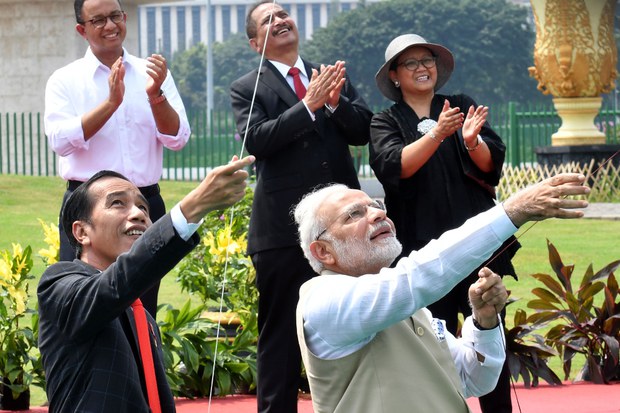India, Indonesia Plan to Develop Strategic Port in Indian Ocean
2018.05.30
Jakarta
 Indonesian President Joko “Jokowi” Widodo (left) and Indian Prime Minister Narendra Modi fly kites after launching the India-Indonesia kite exhibition at the National Monument in Jakarta, May 30, 2018.
Indonesian President Joko “Jokowi” Widodo (left) and Indian Prime Minister Narendra Modi fly kites after launching the India-Indonesia kite exhibition at the National Monument in Jakarta, May 30, 2018.
Updated at 4:13 p.m. ET on 2018-05-31
Indonesia and India pledged Wednesday to strengthen defense ties as the leaders of Asia’s two largest democracies agreed to develop a strategic naval port at the mouth of the Malacca Strait, one of the busiest shipping channels in the world.
Indian Prime Minister Narendra Modi and Indonesian President Joko “Jokowi” Widodo upgraded bilateral relations and signed 15 agreements including on maritime cooperation, according to a joint statement issued after they met at the presidential palace in Jakarta.
“We agreed to boost cooperation in [the areas of] infrastructure and connectivity,” Jokowi told reporters at the presidential palace in Jakarta as he hosted the Indian leader on Modi’s first official trip to Indonesia as prime minister.
Modi, 67, was on the first leg of a three-nation tour of Southeast Asia that will also take him to Malaysia and Singapore.
“We will continue to advance our cooperation in developing infrastructure, including at Sabang Island,” Reuters quoted Jokowi as telling reporters.
Modi embarked on the trip as part of his government’s “Act East” policy, which involves cultivating closer relations with the 10-member Association of Southeast Asian Nations (ASEAN).
“The India-ASEAN partnership can be a force to guarantee peace and progress in the Indo-Pacific region and beyond,” Modi said in a statement read in Hindi after meeting with Jokowi, Reuters reported.
Last week, Jakarta newspapers quoted Indonesian Maritime Affairs Minister Luhut Pandjaitan as saying that the existing port at Sabang, which is about 40 meters (about 130 feet deep), could be developed to accommodate commercial boats and submarines.
Sabang, also known as Weh Island, is about 2 hours by ferry from Banda Aceh, the largest city in the Indonesian province of Aceh. Sabang lies about 109 miles (175.4 km) southeast of the southernmost island in India’s Andaman and Nicobar Island chain.
New Delhi’s access to Sabang, which is at the northern tip of Sumatra island and at the entrance to the Malacca Straits – through which 40 percent of India’s trade passes – would mark a major shift in Indonesia’s ties with India amid rising concerns over China’s growing assertiveness in the region, according to analysts.
Widodo visited New Delhi in December 2016 and was among the 10 ASEAN heads of state who attended India’s Republic Day parade earlier this year.
Jokowi’s agreements with Modi are in line with his “Global Maritime Fulcrum Vision,” according to the joint statement.
During his presidential campaign in 2014, Jokowi focused on the “fulcrum” theme, declaring his goal to make the Indonesian Navy a regional power. Since his election, Indonesia has increased defense spending to modernize its navy through upgrading ports and purchasing new ships, according to The Diplomat.
“We want the Indian Ocean and the Pacific Ocean to remain peaceful and safe for world trade, not used as a platform for the seizure of natural resources, territorial disputes or maritime supremacy,” Jokowi told the East Asia Summit in 2014.
Modi has a similar vision. His “Act East,” a progression from the “Look East” policy dating to 1992, strives to strengthen India’s relationships with ASEAN.
Cooperation in countering radicalism
During their meeting Jokowi, a Muslim, and Modi, a Hindu, discussed the importance of interfaith dialogue to create peace and social harmony while promoting democracy and human rights.
“The two leaders also share the same view of the importance of combating radicalism and re-emphasized the importance of promoting peaceful pluralism that will result in a harmonious civilization and moderation through a holistic approach,” according to the joint statement.
The two countries agreed to hold interfaith dialogue in Indonesia in early October, followed by a similar dialogue in India next year, the statement said.
According to Ahmad Qisa’i, an analyst at the Jakarta-based Paramadina Graduate School of Diplomacy, the bilateral maritime agreement signed by the two leaders would mostly benefit India.
“India needs to ensure the continuity of supply for its nuclear material from Australia and oil from Vietnam, which transported through territory of Indonesia and ASEAN,” he told BenarNews.
He also said interfaith dialogues were not enough on their own to bring peace and social harmony.
“There should be a real way in learning and exchanging the experiences facilitated by the governments of Indonesia and India, through which Indonesian Muslims can study in moderate Islamic study centers in India and vice versa,” he said.







